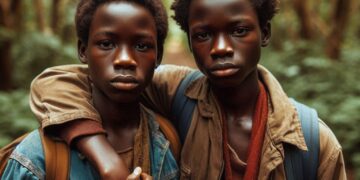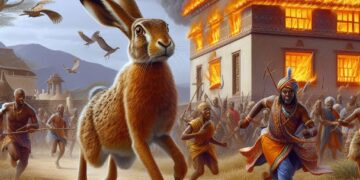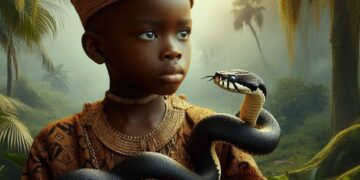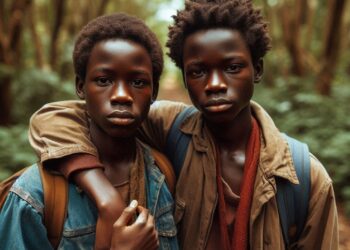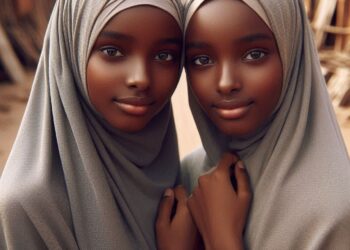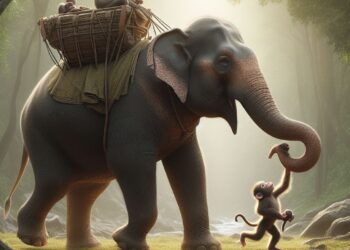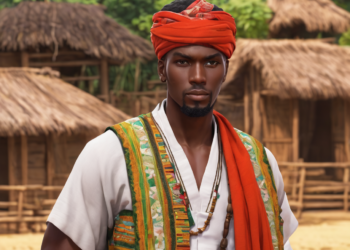In the fertile lands of Kyaggwe, within the prosperous village of Ntanzi, lived a young girl named Zzawedde from the Fumbe Clan. Ntanzi was renowned throughout Buganda for its abundant harvests, even during times of famine elsewhere. Zzawedde and her widowed mother lived in a quaint round hut, surrounded by a flourishing banana garden that was the pride of their home.
The morning sun cast long, dancing shadows through the banana leaves as Zzawedde hummed a familiar tune while peeling matooke. A rhythmic tap-tap echoed through the still air, a comforting backdrop to her morning routine. Her gaze drifted towards the old Muvule tree, its gnarled roots a testament to centuries of standing witness to life in Ntanzi.
Suddenly, a flicker of movement caught her eye. A small, brown frog, its skin glistening with morning dew, was desperately seeking refuge from the relentless sun. Its tiny body trembled visibly as it clung to the rough bark. A pang of empathy shot through Zzawedde. She remembered her mother’s hushed whispers about the spirits that dwelled in every living creature, from the largest elephant to the tiniest insect. These beings, she was told, were guardians of the land, and to harm them was to invite misfortune.
The frog’s vulnerability mirrored her own uncertainty about the path ahead. As she gently scooped up the trembling amphibian and placed it under a short guava tree facing her mother’s hut. She felt a strange connection to the creature, as if their fates were intertwined. As the frog revived in the cool shade, it looked up at her with gratitude and, in a voice that echoed through the leaves, promised to repay her kindness one day.
Soon after, Zzawedde found herself at a crossroads. Four suitors had come seeking her hand in marriage: Kaddu and Kizito, hunters from the Kkobe Clan; Nkurukumbi, a proud herdsman from the distant Kingdom of Bugahe; and Batambuze, a kind Musoga traveler. However, tradition in Buganda dictated that her guardians had the final say in choosing a husband. Requesting to choose her own was an act of boldness, one that required not just courage but wisdom.
Zzawedde, known for her kindness and inner strength, approached her guardians and asked for the right to choose her husband. Impressed by her resolve, they agreed but warned her to choose wisely. Though confident, Zzawedde felt uncertain. She needed guidance, and in her heart, she knew where to seek it. She returned to the guava tree and found the frog, who listened to her plight. The frog, wise beyond its appearance, devised a simple plan: “Let each suitor visit you, and I will be there. Observe how they treat me, for in their actions towards the smallest among us, you will see their true nature.”
On the first day, Kaddu arrived, confident in his status as a hunter. But when he saw the frog, he nudged it aside with his foot, dismissing it as a mere inconvenience. Zzawedde’s heart sank, seeing that Kaddu’s strength was accompanied by a lack of compassion.
The next day, Kizito came, greeting Zzawedde with a smile. However, he merely stepped over the frog with indifference, showing neither harm nor concern. Zzawedde realized that while Kizito was clever, he lacked the empathy she desired in a partner.
Nkurukumbi, the herdsman, visited next. He spoke proudly of the wealth his cattle could bring, but when he saw the frog, he viewed it as an oddity, not worth his time. Zzawedde noted that Nkurukumbi’s heart was too focused on his own pride to truly care for her.
Finally, Batambuze arrived, humble and full of stories from his travels. When he saw the frog, he crouched down and asked it how it fared, then looked at Zzawedde with a warm smile. Together, they listened as the frog told stories of kindness and the importance of caring for all creatures. In that moment, Zzawedde knew she had found her true partner.
Zzawedde chose Batambuze, the suitor who had shown not just respect and kindness to her, but also to the small and seemingly insignificant frog. Their marriage was a celebration of love, not just between two people, but between them and the land they cherished. The frog remained a beloved companion, a constant reminder of the wisdom that often comes from unexpected places.
In the years that followed, the tale of Zzawedde, Batambuze, and the frog became a cherished story in Kyaggwe and beyond. It was said that a man who sought a woman’s hand should never drive away a frog, for in doing so, he might drive away his own happiness. The story was passed down through generations, teaching the children of Buganda the importance of kindness, wisdom, and the enduring power of shared laughter and understanding.

